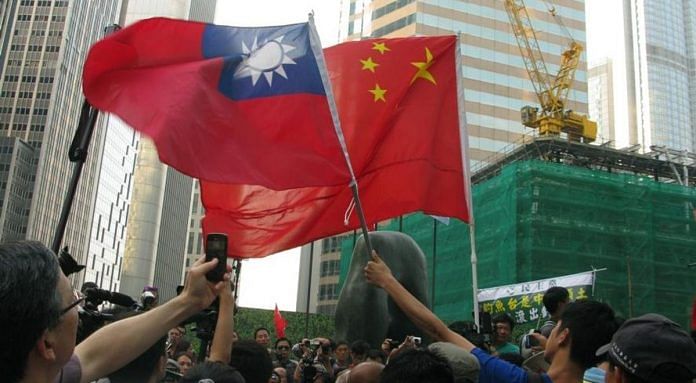Washington: The State Department signaled its approval for a potential $2.4 billion sale of anti-ship missiles to Taiwan, a move certain to anger Beijing and raise tensions further between the U.S. and China days before the American election.
The Trump administration said in a statement Monday that it has notified Congress that it backs the proposed sale of as many as 100 Harpoon Coastal Defense Systems built by Boeing Co., which include 400 land-based missiles.
The new Harpoon anti-ship missiles are intended to be launched from ground-mobile launchers, adding to Taiwan’s arsenal of air and submarine-launched Harpoons from earlier sales.
“The United States maintains an abiding interest in peace and stability in the Taiwan Strait and considers the security of Taiwan central to the security and stability of the broader Indo-Pacific region,” the State Department said in a statement.
The move comes as already-high tensions between the U.S. and China soar even higher. China said earlier that it would impose unspecified sanctions on Boeing’s defense unit, Lockheed Martin Corp. and Raytheon Technologies Corp. after the U.S. State Department approved $1.8 billion in arms sales to Taiwan last week and made a previous announcement of 66 new F-16 jets.
Taiwan thanked the U.S. for the latest arms sale in a statement posted Tuesday on the Presidential Office website.
China to Sanction Boeing, Raytheon, Lockheed Over Taiwan Arms
The latest sanctions will be imposed “in order to uphold national interests,” Chinese Foreign Ministry spokesman Zhao Lijian told reporters Monday in Beijing.
In August, the U.S. and Taiwan completed the sale of 66 new model F-16 Block 70 aircraft from Lockheed. Zhao, the Chinese foreign ministry spokesman, condemned it at the time, saying it violated the One China principle, interferes in China’s internal affairs and will have a “major impact” on U.S.-China relations.
No Material Impact
In July, China — which considers Taiwan part of its territory and resists any recognition of its de facto independence — had announced sanctions on Lockheed Martin for a previous arms sale to the island.
Lockheed hasn’t seen any “material impact” on its sales from earlier sanctions, announced July 14, for selling Patriot Advanced Capability-3, or PAC-3, missile batteries to Taiwan, the company said in a filing last week. The world’s largest defense contractor derives less than 1% of its revenue from China, a Lockheed spokesman said.
“China has not specified the nature of any such sanctions, but could seek to restrict our commercial sales or supply chain, including our supply of rare earth or other raw materials, and could also impose sanctions on our suppliers, teammates or partners,” Lockheed said in the Oct. 22 filing.
With barely a week to go before the U.S. presidential election, both President Donald Trump and Democrat Joe Biden have sought to portray themselves as the tougher candidate when it comes to China.
Donald Trump talks a lot about the art of the deal. But under his watch, China has perfected the art of the steal. pic.twitter.com/OSTsHHTtBQ
— Joe Biden (@JoeBiden) September 30, 2020
China’s moves this year to exercise greater control over Hong Kong prompted many analysts to see the risks rising for Taiwan. With his poll numbers flagging, Trump has sought to blame Beijing for soaring U.S. coronavirus cases and deaths.
Two senior Trump administration officials have traveled to Taiwan in recent months, underscoring U.S. support for the island and prompting China to bolster its military posture.
Ahead of Undersecretary of State Keith Krach’s visit to Taipei last month, for instance, two Chinese anti-submarine aircraft entered the air-defense-identification zone around the island, the Taiwanese Ministry of National Defense said in a statement. The incursion came after China’s military sparked concern by sending more than 20 aircraft into the zone for two days in a row.
Also last month, the People’s Liberation Army Air Force released a video showing H-6 bombers making a simulated strike on a runway that looked similar to one at Anderson Air Force Base on Guam, a key staging area for any U.S. support for Taiwan. -Bloomberg
Also read: US approves $1.8 billion in arms sales to Taiwan amid tension with China




TS Darbari – It is great initiative with futuristic vision. The Basic Exchange and Cooperation Agreement largely pertains to geospatial intelligence, and sharing information on maps and satellite images for defence. According to officials, anyone who sails a ship, flies an aircraft, fights wars, locates targets, responds to natural disasters, or even navigates with a cellphone relies on geospatial intelligence. e indefinitely, which means EMIs have to be paid at some point and unpaid EMIs do carry an interest cost. #TS_Darbari #Ts_Darbari_Blog #TS_Darbari_News #Ts_Darbari_Views #Ts_Darbari_Blogger #TS_Darbari_Comments #Ts_Darbari_Opinion #About_TS_Darbari #TS_Darbari_Articles #Politics #Views #Comments Mr. TS Darbari is a top management professional, with several years of rich & diversified experience in Corporate Strategy, New Business Development, Sales & Marketing, Commercial Operations, Project Management, Financial Management and Strategic Alliances